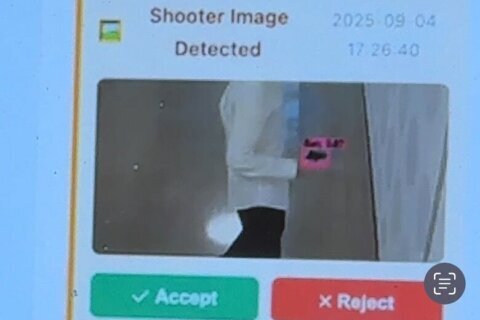One of the men convicted in the killings of two Montgomery County, Maryland, teens the night before their graduation in 2017 will not get a new trial, Maryland’s high court ruled Monday.
Rony Galicia, 30, was one of four men convicted in the killings of 18-year-old Artem Ziberov and 17-year-old Shadi Najjar, who were shot to death in Montgomery Village in June 2017 after setting up a meeting to sell an extra ticket to their graduation ceremony for Northwest High School.
Last year, a Maryland appeals court overturned Galicia’s conviction, and ordered a new trial, ruling that the Montgomery County judge in Galicia’s trial had erred by failing to have an expert witness from Google testify about a gap in location tracking data for one of Galicia’s accounts, and that Galicia’s attorney was improperly blocked from questioning the girlfriend of co-defendant Edgar Garcia-Gaona about statements made after the killings that implicated other suspects but not Galicia.
However, in a ruling issued Monday, the Maryland Court of Appeals, Maryland’s highest court, reversed the earlier ruling on both counts.
At Galicia’s 2018 trial, prosecutors called a Google employee who worked as a record-keeper to testify about Google searches Galicia did around the time of the killings, as well as a two-month gap in location-tracking data, covering the time of the crime. The Google employee testified Galicia had the ability to turn off location tracking on his smartphone.
The lower appeals court ruled the Google employee’s testimony was improper because it should have only come from a witness qualified as an expert in the court.
In its decision Monday, the high court disagreed.
“We hold that a user’s ability to adjust the location tracking feature of a smartphone is within the understanding of the average lay person and that a witness whose testimony referred to that ability did not have to be qualified as an expert,” the ruling stated. “While few could explain the technology used by phones and the network of towers and satellites with which they constantly communicate, the fact that they collect data about users’ habits, including location, is widely understood.”
Regarding the gap in location data that the Google employee testified to, the court said: “The inference that this testimony was intended to help the jury draw — that Mr. Galicia could have manually disabled location tracking around the time of the murders — was well within the understanding of the average lay person.”
Galicia, Garcia-Gaona and Jose Canales-Yanez were convicted in 2018 of first-degree murder and sentenced to life in prison without the possibility of parole in the teens’ slayings. A fourth defendant, Roger Garcia, was convicted in 2019 of second-degree murder and sentenced to 100 years.
Prosecutors said the men conspired to lure the teens to a cul-de-sac in Montgomery Village on a ruse of buying a spare graduation ticket, and, once there, opened fire on the teens, riddling them with bullets.
Prosecutors said the attack was revenge for Najjar, the younger of the teens, apparently having stolen marijuana from Canales-Yanez’s then-girlfriend. Ziberov was an acquaintance of Najjar’s who happened to be there the night of the shooting, and who prosecutors said had nothing to do with the earlier robbery.
During the 2018 trial, Garcia-Gaona’s girlfriend testified that he confessed the day after the killings when they were both watching a TV news report about them. She testified Garcia-Gaona told her about the confrontation with the teens, and then “they just started shooting them.”
The lower court ruled Galicia’s attorney should have been allowed to cross-examine the girlfriend about who exactly “they” referred to, since other statements made before trial implicated the other defendants but not Galicia. His attorney said the vague reference to “they” unfairly prejudiced her client.
Galicia’s defense was that the three others carried out the killings, but that he was not part of the conspiracy and was home watching Netflix on his Xbox at the time.
The high court ruled that the original court did nothing wrong by limiting the attorney’s cross-examination of the girlfriend.
The Associated Press contributed to this report.








